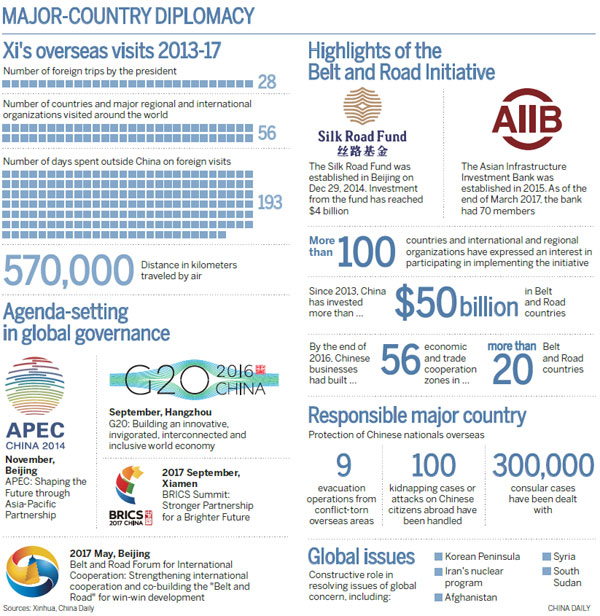Diplomatic skills boost China's role in global affairs

Developments in the past five years have seen the country move to world's center stage
Among the new diplomatic concepts, thoughts and strategies put forward by President Xi Jinping, the idea of building a community of a shared future for mankind is a key contribution.
The concept has become the theme of a major chapter that Xi addressed in the report he delivered at the 19th National Congress of the Communist Party of China on Oct 18.
"We call on the people of all countries to work together to build a community with a shared future for mankind, to build an open, inclusive, clean and beautiful world that enjoys lasting peace, universal security and common prosperity," Xi, also general secretary of the CPC Central Committee, told the more than 2,000 delegates.
He added that China will continue to play its part as a major and responsible country, take an active part in reforming and developing the global governance system, and keep contributing Chinese wisdom and strength to global governance.
Xi used a vivid description of how the international community can use its combined efforts to tackle a range of problems.
The comments built upon Xi's keynote speech at the United Nations in Geneva in January, when he spoke of China's approach to solving problems.
"When I first got a Swiss Army knife, I was amazed that it had so many functions. I cannot help thinking how wonderful it would be if an exquisite Swiss Army knife could be made for our world," he told the audience in Switzerland.
"When there is a problem, we can use one of the tools on the knife to fix it. I believe that with the unremitting efforts of the international community, such a knife can be made," he added, calling for joint efforts to build a "community of shared future for mankind", something he first mentioned at a September 2015 UN summit in New York, where he proposed a road map for building the proposed community.
A month later, Xi's concept was incorporated in a UN Security Council resolution for the first time.
This sort of proposal embodies Xi's and China's diplomatic framework during the past five years that has offered Chinese solutions to global challenges.
Foreign Minister Wang Yi said the president has stressed that China must pursue "major-country diplomacy" with its own characteristics, which "must illustrate salient Chinese features, a Chinese style and Chinese confidence".
"In a different way from traditional major countries, China is striding toward the center of the world stage with more confidence and openness. While building an external environment conducive to its own development, it is also making increasingly significant contributions to world peace and development, as well as the prosperity and advancement of all humankind," Wang said in a documentary aired by China Central Television in September.
Ruan Zongze, executive vice-president of the China Institute of International Studies, says the pursuit of major-country diplomacy meets the demands of both China and the world, as the Chinese and global economies now rely upon each other to an unprecedentedly high level.
"The international community expects that China, as the world's second-largest economy, can raise solutions to major global issues, and at the same time also needs to boost interaction with the world," he says.
Global responsibilities
At the G20 Summit in Hangzhou in September last year, Xi emphasized the concepts of equality, openness, cooperation and sharing in global economic governance. Against the backdrop of a trend for deglobalization and sluggish growth around the world, China proposed building an innovative, open, interconnected and inclusive global economy.
Data released by the National Bureau of Statistics on Oct 10 show that China's average contribution to world growth from 2013 to 2016 was about 30 percent, the largest among all countries and higher than the total contribution from the United States, the eurozone and Japan.
In the past five years, measures, proposals and concepts put forward by China have injected vigor into the reform and optimization of global governance. China proposed establishing the Asian Infrastructure Investment Bank and the BRICS New Development Bank. Last year, the International Monetary Fund included the Chinese currency, the renminbi, in the special drawing rights basket.
In his January speech at the UN, Xi pledged to pursue a win-win strategy of opening up, sharing China's development opportunities with other countries and welcoming them "aboard the fast train of China's development".
"China's development has been possible because of the world, and China has contributed to the world's development," he said.
In the next five years, China will import $8 trillion worth of goods, attract $600 billion in foreign investment and provide $750 billion in outbound investment, he said, adding that Chinese tourists will make 700 million visits overseas. According to Xi, from 1950 to 2016, China provided foreign countries with aid worth more than 400 billion yuan ($60 billion; £51 billion euros; £45 billion).
Providing solutions
In March last year, the UN Security Council for the first time incorporated the Belt and Road Initiative in a resolution, calling on all parties to actively participate in regional connectivity and economic cooperation programs such as the Belt and Road.
The initiative, proposed by Xi in 2013, aims to build the Silk Road Economic Belt and the 21st Century Maritime Silk Road through the concerted efforts of all related countries to benefit all participants by promoting unimpeded trade, financial integration, infrastructure connectivity and closer people-to-people exchanges.
China has actively assumed its international responsibilities and participated in global governance by putting forward new concepts, thoughts and plans to reshape the global governance system, according to Jin Yong, a professor of international relations at Communication University of China.
The initiative's spirit of peace and cooperation, openness and inclusiveness, mutual learning and mutual benefit has injected new momentum into global governance, he says.
On Sept 22, China's Foreign Ministry and the UN Department of Economic and Social Affairs signed a memorandum of understanding to help build capacities for developing countries involved in the initiative. By Sept 25, 74 countries and international organizations had signed agreements with China to boost Belt and Road cooperation.
"I am convinced that the Belt and Road Initiative will serve as a new platform for all countries to achieve win-win cooperation and that it will create new opportunities for implementing the (United Nations) 2030 Agenda for Sustainable Development," Xi said while delivering the keynote speech at the opening ceremony of the BRICS Business Forum in the coastal city of Xiamen, Fujian province last month.

(China Daily Africa Weekly 10/27/2017 page19)
Today's Top News
- Xi calls for fostering new highlights in China-Sri Lanka cooperation
- AI curbs show Biden's rejection of cooperation: China Daily editorial
- Global medical minds unleash hospital innovation trends
- Xi urges China, Vietnam to step up connectivity, new quality productive forces cooperation
- Xi holds phone talks with Vietnam's top leader To Lam
- Chinese, Sri Lankan presidents hold talks in Beijing






























